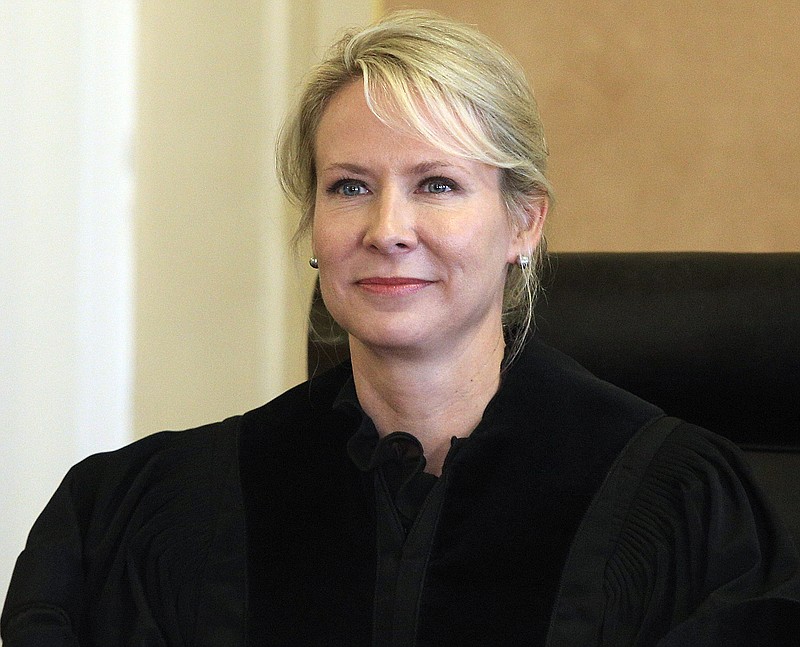Arkansas Supreme Court Justice Courtney Hudson, who out-fundraised and outspent her opponent, appeared to enjoy an easy win in her race for the Arkansas high court, with a victory that, if affirmed, would also give Gov. Sarah Huckabee Sanders the opportunity to appoint her second justice.
If the Tuesday vote counts are certified, Hudson will assume the Associate Justice Position 2 seat that came into play when Justice Robin Wynne of Fordyce died in June. Hudson’s opponent was Carlton D. Jones, a circuit judge from Texarkana.
Wynne’s passing gave Sanders her first Supreme Court appointment. She chose Cody Hiland, chairman of the state Republican Party and a former federal prosecutor, to hold the seat until this judicial election.
The Associated Press called the race for Hudson about 75 minutes after the polls closed with 48% of the vote counted. Her apparent win will give Sanders the Republican governor’s second Supreme Court appointment, while the four-way race for chief justice, which seems heading for a November runoff between two other justices, would give Sanders her third appointment.
Sanders’ Republican predecessor as governor, Asa Hutchinson, only appointed one justice during his two terms in office. Democrat Mike Beebe, likewise a two-term governor, had two justice appointees during his tenure, but only because one of them spent about a week on the job before poor health forced him to give up the post.
Hudson, 51, of Fayetteville is already one of the high court’s longest-serving members. She’s currently the Position 3 justice with a term that expires at the end of 2026.
If Tuesday’s results hold true, Hudson will finish the year as Position 3 justice, then begin her new role in January, which gives Sanders months to choose a replacement to assume the Position 3 seat. Arkansas’ seven Supreme Court justices serve eight-year terms. Associate judges each earn $187,961 annually.
With an estimated 85% of the votes counted, unofficial returns were:
Hudson 231,279
Jones 152,194
Hudson said she sought the Position 2 seat because it would allow her to serve a few more years on the court before reaching 70 in 2042, the age when circuit and higher judges are generally required to leave the bench or forfeit retirement benefits.
In 2016, Hudson ran unsuccessfully for chief justice, losing to Dan Kemp, who collected about 58% of the vote. She was reelected in 2018, capturing 57% of the vote after a runoff.
Hudson has some historical firsts in her judicial career. When she was first elected to the state’s high court in 2010 at age 38, she became the youngest candidate ever elected to the high court and the first woman to win a Supreme Court seat in a contested race. She sought the post after two terms on the Court of Appeals.
Hudson and Baker are the court’s senior members, having been elected together.
According to the latest figures from the Arkansas secretary of state, Hudson collected nearly twice as much in donations as Jones, and she spent more than two times what he did.
Hudson raised $199,705 in contributions while spending $159,256. Most of that — $100,361 — was spent on TV ads.
Further, Hudson had 18 contributors who reached the $3,300 maximum donation: Brentt Tumey of Rogers; Carlton Saffa, Little Rock; Brian Faught, Sherwood; Andrew Berner, Jonesboro; Christina Berner, Jonesboro; Jacob Newland, Little Rock; Joel Hoover, Little Rock; Elizabeth Caldwell, Little Rock; Bryan Ferguson, Sherwood; Zach Wirges, Sherwood; Keith Felton, North Little Rock; Terry Rollins, Little Rock; John Burkhalter, North Little Rock; Ron Hope, Little Rock; Taylor Hudson, California; James Davis, Sherwood; Fred Sands, Brinkley; and Katherine Murphy, Bentonville.
Jones raised $100,481 and has spent $69,140, with direct mail being his largest expense at $29,542. Marion Humphrey, an attorney and retired Pulaski County circuit judge, was Jones’ only donor to reach the $3,300 maximum.
Jones’ top contributors included Jana Haltom of Texarkana, $3,000; Shorty Barrett, Texarkana, $2,000; Brandon Cogburn, Texarkana, $1,500; Erin Keil, Texarkana, $1,500; Sam Royster, Garland City, $1,500; Charles Banks, Jonesboro, $1,500; Charles Banks, $1,500, Little Rock; and Matt Keil, Texarkana, $1,500.
A Jones victory would have made him the first Black attorney elected to the high court. Jones is believed to be the state’s first Black elected prosecuting attorney, having won that position in 2010 with 70% of the vote in the Texarkana-based 8th Judicial District-South. That district covers Miller and Lafayette counties.
In 2014, Jones was the first Black man elected circuit judge in the Texarkana-based district, winning the position without an opponent.
The late George Howard Jr. of Pine Bluff was Arkansas’ first Black justice, serving by appointment of Gov. David Pryor in 1977. The first African American woman to serve as a Supreme Court justice was the late Andree Layton Roaf, who was appointed by Gov. Jim Guy Tucker in 1995.
Attorney Ron Sheffield of Little Rock was the state’s most recent Black justice. He was appointed by Gov. Mike Beebe in January 2010 to hold the seat vacated by the retirement of Annabelle Clinton Imber Tuck until December 2010.
The late Elsijane Trimble Roy of Lonoke was Arkansas’ first woman to serve as circuit judge, Supreme Court justice and federal judge. Betty Clark Dickey, 84, was the state’s first female chief justice.
This story has been updated. It was originally published at 9:07 p.m. under the headline "Hudson projected to win Arkansas Supreme Court Justice Position 2 race."

